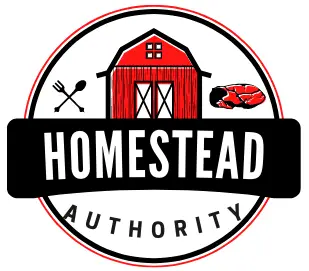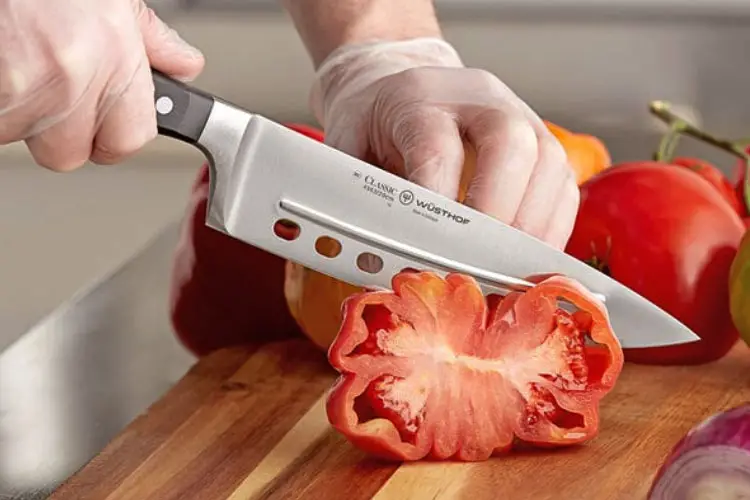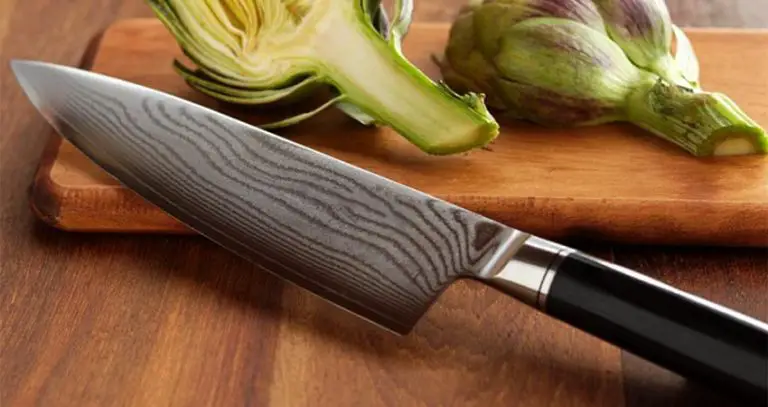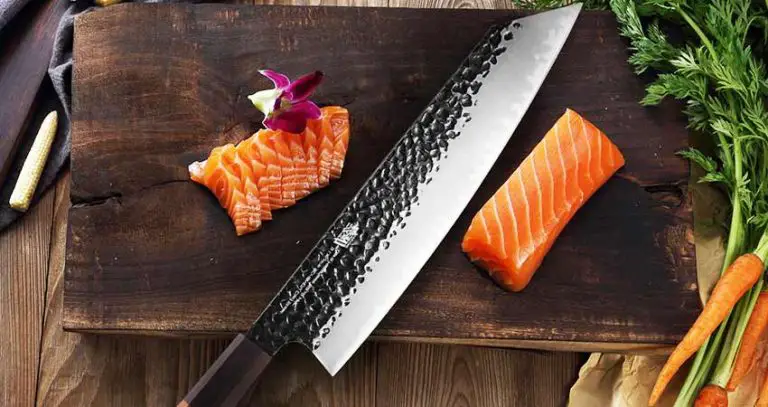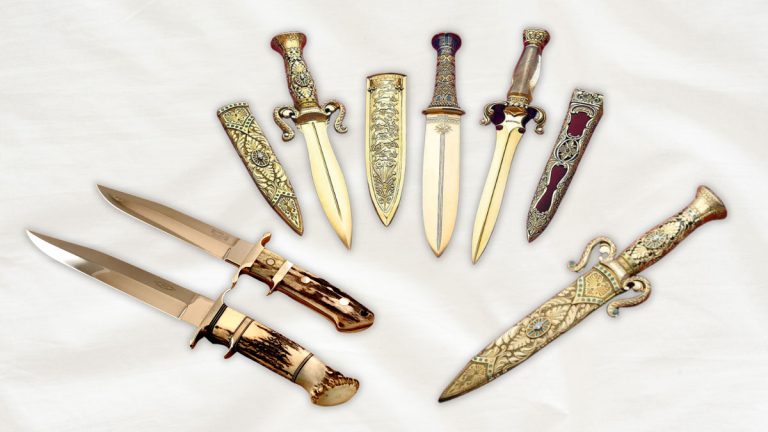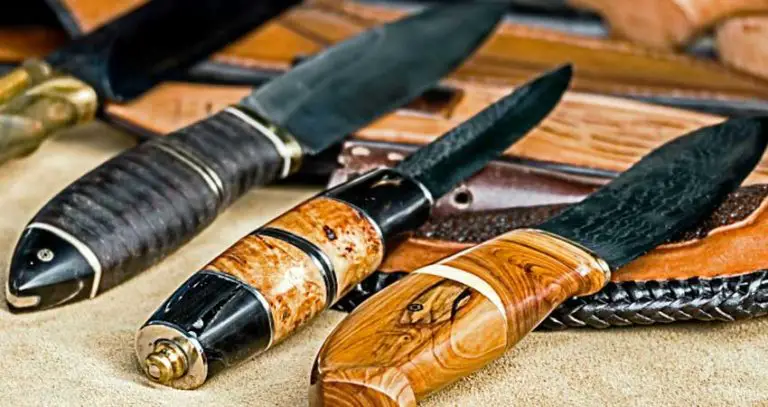What Are the Functionalities of Holes in Knife Blades?
Whenever we imagine knives, we think of a wide, plain blade. But some knife blades have holes of different sizes on them.
You might wonder what is the functionality of knives with holes in the blade. These holes are made for multiple reasons. Firstly, the holes in knife blades make the knife a lot lighter and reduce friction while cutting. Storing knives also becomes easier due to these holes. Some pocket knives can be easily opened using holes.
And manufacturers can save a lot on material costs by making these holes. Let’s discover the functionality of knives with holes in the blade in detail.
Discover the Functionality of Knives with Holes in the Blade
Cutting things is the main purpose of a nice, and sharp knife. But knife makers need to focus on some other aspects too. Get to know them.
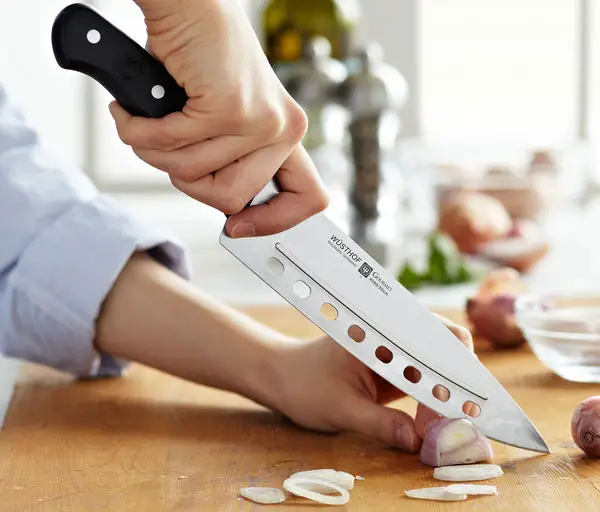
1. Holes Make Knives Lighter
We commonly use kitchen or chef knives to cut veggies, fish, meat, and many more. These knives usually have a thicker blade that makes the knife heavy. Holding these knives for extended periods can exhaust your wrists or arms.
When holes are made in knife blades, some of the blade material is removed, reducing the overall weight. So you can comfortably use the knife for longer without getting tired.
2. Holes Reduce Friction
Friction happens when two surfaces rub against each other. For example, when you cut something with a knife, there will be friction between the cut surface and the blade. So, you need to apply more force to the knife to cut that thing.
Making holes in the blade reduces some surface area that could come in contact with the thing you are cutting. So you can easily cut things with less pressure.
3. They Prevent Things from Sticking
We mainly cut wet things in the kitchen, and you might have seen the thin slices of a fruit or veggie cling to the blade. It is very inconvenient and reduces your cutting speed.
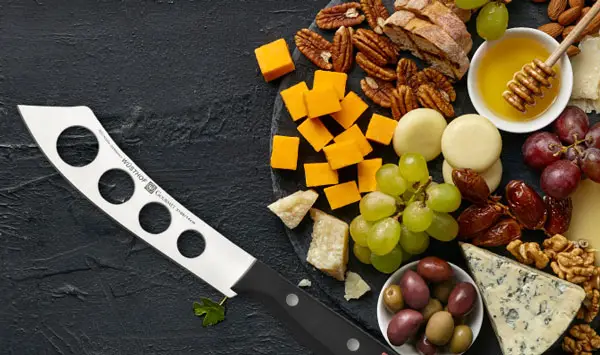
If there are holes in the blade, sliced objects get less space to cling to. As a result, you can do cleaner and faster cuts.
4. Knives with Holes are Easier to Store
Storing a knife can be a big hassle in the kitchen. You often need to look for table stands or knife sheaths to store the knife safely. But if there are holes in the knife blade, they can easily be hung on wall hooks.
This way, you need a lot less space to store the knife than in boxes or sheaths.
5. It Improves Aesthetics and Brand Value
A traditional kitchen knife with a solid blade is cliche to most of us. But when we see some unusual holes in the knife blade, it creates curiosity and increases our attraction to that knife.
Brands know this, and they intentionally make knives with unique designs to catch our attention. It also helps them increase their brand value among customers.
6. Manufacturers Can Save Cost
A good kitchen knife can cost hundreds of dollars, depending on what material is used to make it. And the quantity of material used in the process is also a big factor in deciding the price.
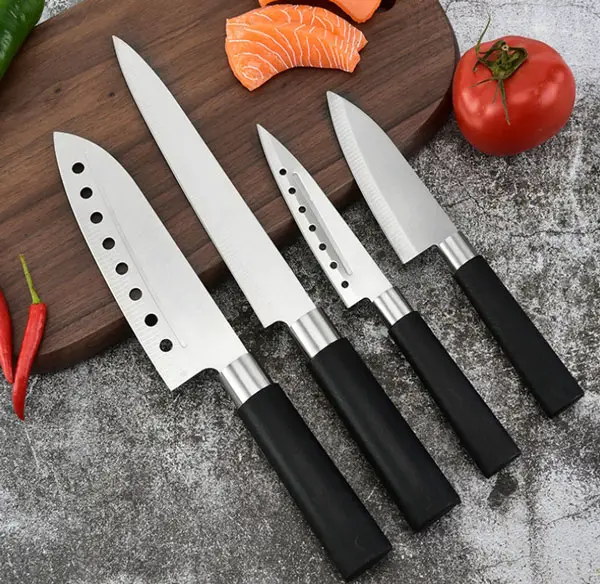
Knifemakers can reduce these knives’ manufacturing costs by removing some materials from the blade. They can then recycle that material to make new knives.
7. Some Knives are Easier to Open with Holes
Folding knives are also commonly used for various purposes. As these knives are folded into a safety case, opening them often requires both hands.
But if there is a hole in the blade that is exposed, you can use your thumb to open the blade. It is helpful if one of your hands is engaged.
Can Holes Make Knife Blades Weak?
The answer to this question depends on several conditions.
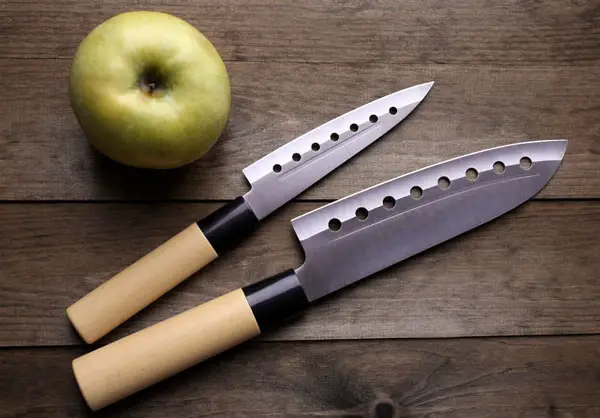
- First of all, holes won’t weaken knife blades significantly if the blade is thick and made of high-quality material.
- But if the blade is too thin, holes in the blade can make it too flexible. It might not seem like a problem as long as you cut soft things. But when you run the knife through harder objects, such as raw guava, the knife blades can flex too much.
The blade can be damaged if you apply too much pressure on the knife. So, you should carefully choose a knife with holes in the blade.
FAQs
Here are answers to some frequently asked questions about holes in knife blades.
Q: Can you sharpen a knife with holes in the blade?
A: Yes. You can sharpen a knife with holes in the blade but be careful while sharpening not to put much pressure on weak areas. Every knife blade needs sharpening at some point.
Q: Do dimples have the same functionality as holes in the blade?
A: Dimples just reduce friction and stickiness. But they can’t make the knife as lightweight as holes can. Also, dimples aren’t very functional for storage or other purposes that holes serve.
Q: What is the name of the holes in a knife blade?
A: Holes in a knife blade create small air pockets while cutting something. So, they are often called aerated.
Conclusion
A common misconception is that holes in a knife blade are used solely for design purposes. But that can’t be far from the truth. These holes are actually made to keep the knife lightweight and reduce friction or sticking.
Plus, hanging the knife or opening the blade with one hand is easier when there are holes in the blade. You can discover the functionality of knives with holes in the blade from the above discussion and find answers to some common questions.
